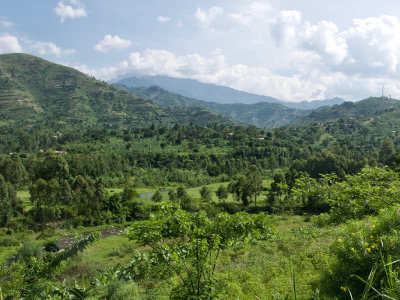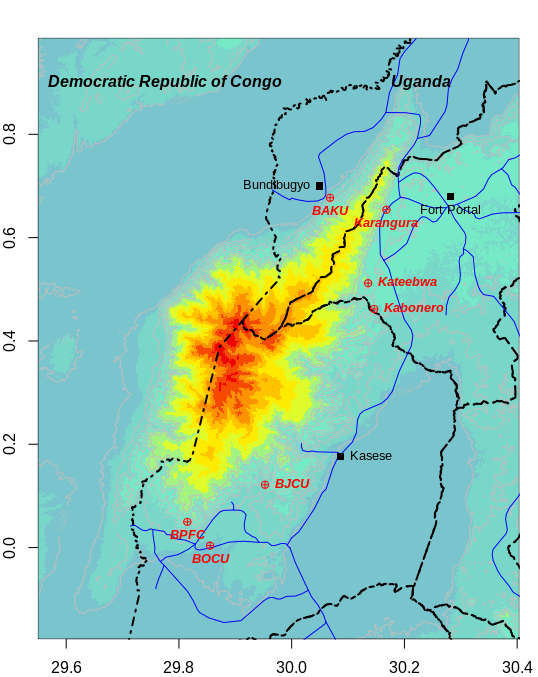The Rwenzori coffee project
Home of the Rwenzori coffee project
Home of the Rwenzori coffee project
Welcome to the Web portal of Rwenzori coffee geographical indication project.
 In the following pages, you will find all project related information (that are many), including:
In the following pages, you will find all project related information (that are many), including:
The project details and objectives, and all involved contributors,
A user-friendly compendium about Arabica coffee farming, covering all related topics from agronomy, pests and diseases, to market organization, marketing and certification. More details →
Some specific pages dedicated to the certification standards involved in the Triple Certification approach implemented in the project, with some focus on Geographic Indication (GI) certification system. More details →
A "Marketing" page is open for those interested in purchasing Rwenzori Coffee lots and learning more about its availability. More details →
In the beginning of the 20th century, Arabica coffee was introduced in Western Uganda on the slopes of the Rwenzori Mountains. The region is optimal for coffee farming: between 1500m and 2000m of altitude, climate conditions are favorable to Arabica growth and soil richness is evenly distributed, ensuring satisfying production levels.
In these conditions, coffee farming started to attract an increasing number of farmers from the mountains, who were able to improve their livelihood by generating an important source of income from the crops.
Until the 90s, Rwenzori coffee production remained discreet, limited in volume and known only by coffee trading specialists. The situation changed during the 2000s, when the coffee market initiated an important mutation which definitely impacted the region’s production: from a traditional commodity market, where volume and price prevail in trade negotiation, a new market segment emerged, where quality receives increased consideration. The “Specialty coffee” market segment was born and since then it has continuously grown, supported by a sustained demand from consumers who developed a connoisseur attitude, interested in flavor and aroma; new coffee consumers are now looking for products of quality, with specific and enjoyable combination of aromas.
Achieving the expected level of excellence, coffee from Rwenzori naturally found its way to the specialty market. It is nowadays developing increasing interest from consumers, inciting Rwenzori coffee farmers to maintain high quality production standards.
In many ways, the context is a great opportunity: the sustained demand from consumers ensure the sale of the production at decent prices and it is an efficient economic situation to transfer richness to producers’ communities, ensuring social and economic growth to the region. The situation also ensures the supply to consumers of the beverage they are looking for.
As such, the situation is ideal to ensure the contentment of all parties. However, it is at risk if one considers the increasing competition on the specialty market and the need of guaranty to consumers of sustainable, high quality standards.
Therefore, this initiative aiming at setting production rules, regulation and control procedures in order to protect and preserved the quality of Rwenzori coffee, which is offered to coffee connoisseurs.
Quality is an important and fascinating concept but, if one think about it, not that simple to evaluate. It can be applied to many various domains, from people to industrial processes, it can be specific or general, and its evaluation can be quantitative (with precise measurement) or purely subjective with statements such as “I like” or “I don’t like”, “it is good”, or not, “it is beautiful”, or not really. Dealing with subjectivity is probably the most interesting case, but it is certainly the most challenging one. It is the one we are going to face when dealing with “coffee quality”.
Working on coffee quality, we can choose to focus our attention on...
Rwenzori coffee project considers all these criteria to guaranty the best, sustainable quality to consumers. To do so, a certification program is designed and implemented to fix production and marketing standards that apply to the region.
The project combines three different approaches to achieve an optimal result, which is quite original. Two of these, the Fair Trade and Organic certificates, focus on production and management methods; the former to favor good governance and equitable management, the latter to promote practices that support human and environment health. They are presented in detail further on. The third one, Geographical Indication certification, deals more with cup quality, its description and how its characteristics originate from the Rwenzori area. It is also a means to reinforce and structure the farmers’ ownership of the activity. The concept of GI and the way it is implemented are presented in separate pages of this site.
The project is born from the need to organize and structure the coffee production in the Rwenzori area, to gain in efficiency and to secure a stable access to the market, for a sustainable economic activity.
Triple certification rapidly becomes a solid option to achieve the objective. It was developed by Cirad (Centre International de Recherche en Agronomie pour le Développement) and NUCAFE, a national representative of coffee farmers’ organizations, in collaboration with URSB (Ugandan Registration Services Bureau), which provides the legal environment of Geographical Indication in Uganda.
They rapidly obtained support for the initiative from two local cooperative unions - Bukonzo Organic Cooperatives Union (BOCU) and Kikface cooperative - and five independent and recently created cooperatives - Karangura, Kabonero, Kateebwa, Bukonzo Progressive Farmers (BPFC), and Bukabughendera (BUKA). Altogether, they represent a community of 8300 producers organized in 21 cooperatives from all parts of the Rwenzori.
Under this structure, the proposal generated interest and received a favorable reaction from the European Commission, who agreed to fund the project under the Switch Africa Green Programme, for the promotion of Sustainable Consumption Production and Circular Economy concepts through support to SMEs.
The project started in February 2018. Slightly delayed due to adverse weather conditions and the Covid pandemic, it will come to its end in July 2022 after four and a half years of work.


So many contributed to the implementation of the project that it is simply impossible to name all of them. But let us thank, for their permanent support and commitment:
The management staff and producers from Bukonzo Organic Cooperatives Union (BOCU), Kikface association and Karangura, Kabonero, Kateebwa, Bukonzo Progressive Farmers (BPFC), and Bukabughendera (BUKA) cooperatives.
Dr Didier Snoeck and the SUCAFINA company for their guidance in coffee agronomy practices and opening access to their coffee practices manual.
Drs Regis Babin and Robert Copland (Icipe) for sharing their images of coffee pests, and Drs Natacha Motisi (Cirad) and Weyessa Garedew (Jimma University) for their illustration of coffee diseases.
Icipe GIS unit for sharing digital information used for mapping Rwenzori site

Copyright © 2022 (v2.1.0)